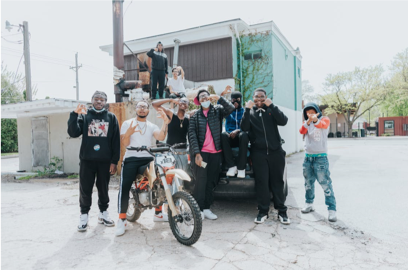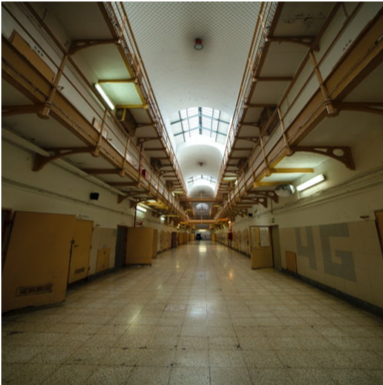By Natalia Venegas / GICJ
 Since the 1990s, El Salvador has become a very violent country, with very high murder numbers. These crimes are a direct consequence of the rivalry between the two main gangs in the country. The gangs "Mara Barrio 18" and "Mara Salvatrucha 13 (MS-13)", have maintained a rivalry that has posed a threat to national security, which has had a significant impact on the increase of murders in El Salvador. These gangs are present in almost 94% of the country’s 300 townships. From the outset, they demand unconditional loyalty to the "mara" from their members and are trained to commit murder, rape, abductions, and extorsions. The name "mara'' comes from "marabunta", which is the name of a group of migratory ants that devastate everything in their path. Central American criminal groups have used this metaphor to name themselves.
Since the 1990s, El Salvador has become a very violent country, with very high murder numbers. These crimes are a direct consequence of the rivalry between the two main gangs in the country. The gangs "Mara Barrio 18" and "Mara Salvatrucha 13 (MS-13)", have maintained a rivalry that has posed a threat to national security, which has had a significant impact on the increase of murders in El Salvador. These gangs are present in almost 94% of the country’s 300 townships. From the outset, they demand unconditional loyalty to the "mara" from their members and are trained to commit murder, rape, abductions, and extorsions. The name "mara'' comes from "marabunta", which is the name of a group of migratory ants that devastate everything in their path. Central American criminal groups have used this metaphor to name themselves.
The "maras" originated in the United States in the 1980s. Migrants who came to the United States from Central America decided to unite to protect themselves from other urban gangs. The majority decided to enlist in the two most prominent gangs: "Barrio 18", of Mexican origin but which welcomes Salvadorans. And Mara Salvatrucha 13 (MS-13) only accepted members from El Salvador. Already in 2022, both gangs were characterised by the use of extreme violence. In California, their power was such that the US took measures such as the mass extradition of these gang members to El Salvador in the mid-1990s. An estimated 4,000 were arrested and deported. After returning to Central America, the gangs began to take the law into their own hands [1].
 In 2019, the figure of president Nayib Bukele became more prominent in El Salvador. One of his main promises was to end gang violence. During his first years in office, the homicide rate dropped from 105 to 20 per 100,000 inhabitants. Various members of the international community and local media have questioned the reason for the considerable decrease. Unfortunately, the number of murders increased in 2022. President Bukele’s response was to decree a state of emergency and order the imprisonment of thousands of gang members. The President also threatened gang members by keeping their peers starving in prison. And by ordering the construction of another prison exclusively for members of these criminal structures.
In 2019, the figure of president Nayib Bukele became more prominent in El Salvador. One of his main promises was to end gang violence. During his first years in office, the homicide rate dropped from 105 to 20 per 100,000 inhabitants. Various members of the international community and local media have questioned the reason for the considerable decrease. Unfortunately, the number of murders increased in 2022. President Bukele’s response was to decree a state of emergency and order the imprisonment of thousands of gang members. The President also threatened gang members by keeping their peers starving in prison. And by ordering the construction of another prison exclusively for members of these criminal structures.
President Bukele said: "If they unleash a crime wave, we will take away the food in the prisons. You'd better be quiet and let yourselves be arrested. At least there you will live, and you will have food”. He also stated: "I don't care what the international organisations say, let them come to protect our people, let them come to take their gang members away, if they want them, we will hand them all over to them" [2]. In fact, according to some reports, by order of the president, more than 20,000 gang members remain in their cells "unable to see a ray of sunlight", and their sleeping mats have been confiscated. Their food ratio has been changed to just two a day after an alarming rise in homicides. The country also reported that 50 gang leaders have been transferred to the maximum-security prison known as Zacatraz and confirmed that the inmates only receive two plates of food a day. He said that they receive bread with beans and a soft drink in the morning, and at noon they receive two taco tortillas with beans and their soft drink.
Following the declarations and measures taken by President Buleke, UN Human Rights spokesperson, Liz Throssell, expressed concern "at the series of measures recently introduced in El Salvador in response to the increase in gang killings". She also stated that: "we recognise the challenges posed by gang violence and the duty of the State to ensure security and justice. However, it must be done following international human rights law".
The Office of the High Commissioner for Human Rights (OHCHR) is concerned about certain amendments to criminal law and criminal procedure and the state of emergency. From the perspective of international human rights law and standards, the imposition of elevated sentences, including those against children, raises grave concerns. The two-year limit on pretrial detention was abolished as part of the reform. Teenagers associated with gangs who are convicted of serious crimes could be sentenced as adults and placed in an adult prison instead of juvenile detention. Teenagers involved in gangs can now serve their sentences in adult detention centres. Ms Throssell added that "those aged 12 to 16 years must now serve a 10-year term of imprisonment instead of 7 years, and those aged 16 to 18 years must serve a 20-year term". The other concern she has is that in prisons in Latin America, there is violence among inmates, and prisons are overcrowded. In particular, juveniles being held in the same prison as adults is a concern [3]. The situation is of great concern because they are exposed to sexual violence and criminal activities. These measures also go against articles 37 and 40 of the “Convention on the Rights of the Child”.
Geneva International Centre for Justice (GICJ) is deeply concerned about the violence in Central America and specifically about the effect that gangs or "maras" have on the daily lives of the Salvadoran people. The excessive violence in the country and in the region affects the security and human rights of the population. GICJ also considers that the government of El Salvador must respect international human rights law, especially with regard to basic human needs such as food and the sentencing of minors.
Mara Salatrucha, Barrio 18, MS-13, Gangs In El Salvador, Maras In El Salvador, End Gang Violence, Criminal Reform, El Salvador, Basic Human Needs, Central America, Human Rights, GICJ Geneva International Centre for Justice, Geneva4Justice, Justice
[1] https://www.france24.com/es/programas/historia/20220406-historia-maras-nayib-bukele-el-salvador
[3] https://news.un.org/en/story/2022/04/1115562
Images source: pexels












